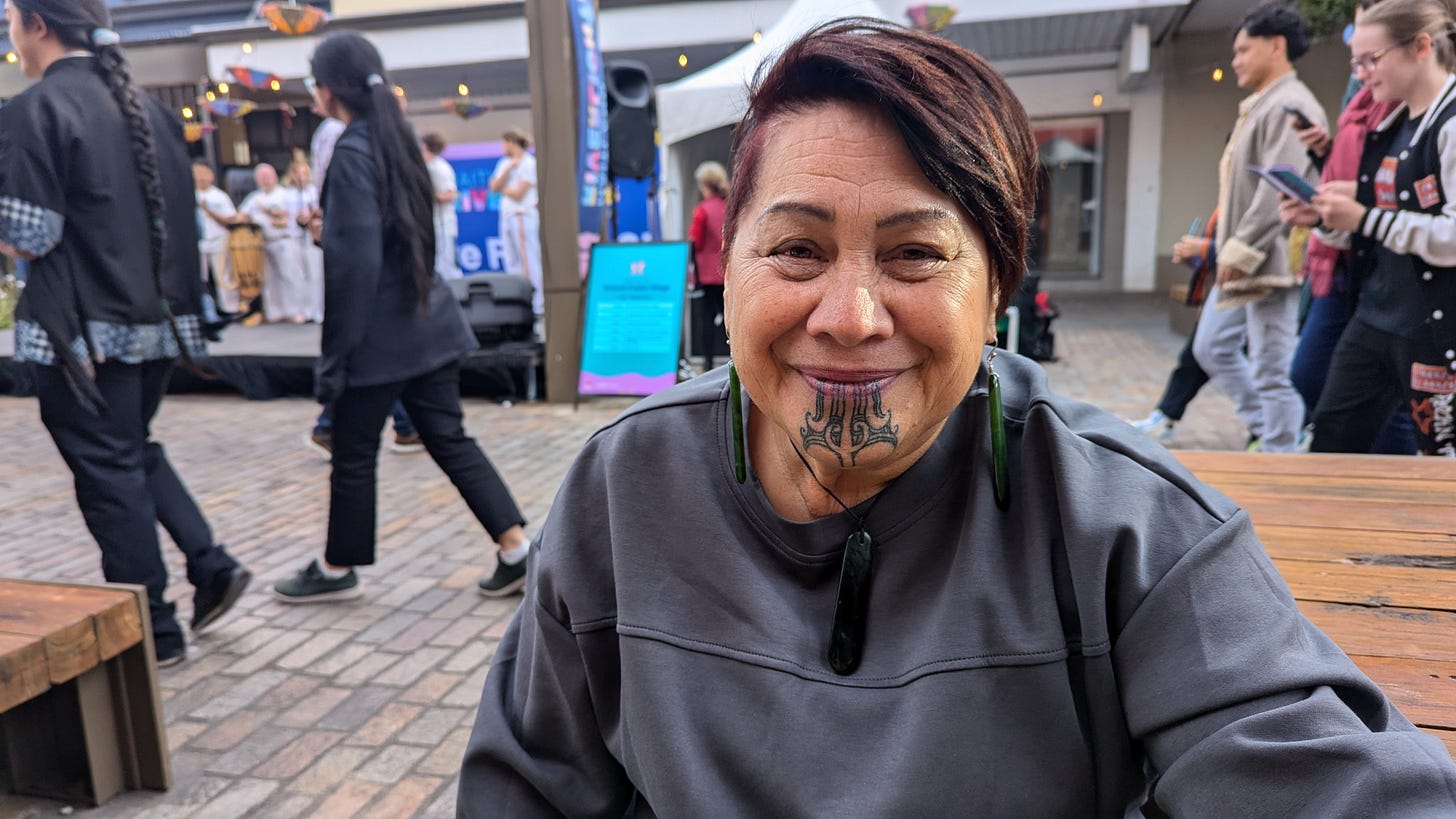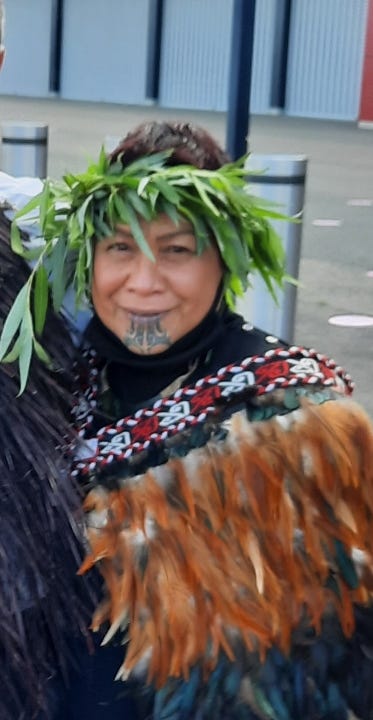Meet Shvon Coster of Te Ūkaipō Māori Club
reconnecting people to their roots, the move to taha Māori,
It’s a dance unlike anything I saw growing up in the US. In the Carolinas I observed square dancing and contra dancing at big open dance halls, bumping and grinding at night clubs, the Macarena and Electric Slide in PE class and the never-ending awkward slow dances at proms and other high school coming-of-age experiences. Before I went to Latin America I knew about Latin dance as well thanks to pop stars like Shakira, J.Lo, Ricky Martin and Enrique Iglesias.
Imagine my joy and fascination when I arrived in this part of the world and saw completely different types of dancing, dances that American media tended to not pick up on, or at least I missed it in my circles.
Last month at Maitland’s multicultural Riverlights Festival I saw for the second year in a row the spellbinding dances of a local Māori group, Te Ūkaipō Māori Club.
Te – as in TEAR a piece of paper
U – as in OO – Roo
Kai- as in KYak
Po - as in POUR a drink
A casual observer will notice three distinctive things about the haka: the expressions on the dancers’ faces, the loud vocalizations and the tattoos on their chins. Both times I’ve watched this performance at Riverlights I’ve been struck by the piercing gaze of the performers. It’s memorizing.
After the Riverlights performance last month, I sat down with the team’s cultural advisor, Shvon Coster to learn about what the group is and how she got involved. Shvon was very kind to not only let me interview her but also follow up with me to make sure I got the spelling of all the words right. (Pronunciation in the voiceover might be less correct. I did my best Shvon!)
Shvon is one of just a few members of Te Ūkaipō whose whose facial ancestral scared marking is permanent. She explained to me the ancestral marking.
”It is the birthright of all Māori women. But every family, tribe, hapu, every iwi have their own guidelines around that. In my family, my elders would choose who they thought should carry it. We had to be asked. So I was raised knowing that they would be quietly observing to ensure I was respecting our teachings and tikanga, {T-car-na} our Kawa {kahwah} traditions and culture. Kawa refers to ‘what we do’, Tikanga refers to how we do it. It differs from tribe to tribe. It is always about ‘what perspective are you coming from?’ If you were sincere about it carrying moko kauae. For me it requires humility, honesty, nice principles, caring, peaceful energy about you. So that even when you're performing, people get that from you,” she says.
Shvon loves Australia; she’s lived here 35 years! She moved here to make a better life for herself and her family. She’s originally from The Bay of Islands on the North Island of New Zealand. She grew up steeped in Māori culture.
”In in my home, we spoke Māori and as a young child, I attended a Māori school where the language was all Maori. Then all of a sudden they told us one day, ‘you have to speak English.’ You can imagine the class was very quiet,” she says. “Nobody knew English, so our language was taken from us. We weren't allowed to speak the language at school. A lot of things weren't allowed to be spoken of publicly when it came to our culture and our traditions. These were left for home”
Shvon has been involved with Te Ūkaipō Māori Club for more than ten years. Their club provides an outlet and space for the everyone, but particularly Māori community to come together and regain, maintain and retain those sacred teachings/lessons handed down to them by our ancestors. There are 80+ members in the club, some are born and bred here in Australia and others have moved from New Zealand to Australia.
”We welcome everybody and anybody. We're not a competitive group, but we certainly have a lot of fun. We enjoy what we're doing. For a lot of Māori or New Zealanders that live here, it is an introduction to their own culture. Having not had the opportunity to ever experience kapahaka, or te reo {tear-re-ore} (language) or hakapoi, (poi action songs) waiata (songs) haka-taiaha (Maori weaponry) It is all very new to them. So, we are happy to give them a very basic understanding of those traditions that we have in New Zealand,” Shvon says.
She has observed a huge resurgence in Māori language in the last 30 years. It is wonderful, and Shvon feels the need to maintain that.
“In the last 15 to 20 years, there's been a huge, huge shift. My Dad, in fact, was one of quite a few kaumatua kuia {co-mar-two-are} of Maori elders from throughout New Zealand that were brought together to create another dialect which would include words from other tribal dialects. So Māori have a lot of tribes, and we all have our own dialects, but in order for it to be accepted, these elders created a universal one, which was then introduced into kindergarten, primary school, into university. That's what's on the curriculum now, so everyone kind of can understand each other. I'm very pro Ngapuhi which is my tribe, so if I am speaking with someone else, sometimes I don't understand, right? We have a general idea, but yes, it’s more important that regardless of the dialect we use, we are acknowledging our taha Māori (Māori side). It is beautiful. Now a lot more people are that journey,” Shvon says
Shvon told me anyone from any cultural background is welcome to get involved with their group, even myself, the clueless American.
Coincidentally, last week a video in New Zealand’s parliament went viral when a Māori lawmakers staged a haka in protest during a vote on a bill that reinterpreted the Māori’s 184-year-old treaty. It is absurd and fantastic to watch. We need more cultural dances as forms resistance in big institutions. I love how the haka performance ultimately brought far more attention to a legislative issue than it would have gotten otherwise. How great is it when we can use art and culture to directly and effectively influence politics?!
Shvon is going back to New Zealand Friday and wishes she could have been there last week to support the Hikoi.
”That’s “law” and it totally disregarded “lore,” that’s what it’s about,” Shvon says. “We have a treaty, and they’re trying to change the translation of it to suit themselves.“
Thank you so much to Shvon for sharing her culture and community with me. Enjoy your trip back to New Zealand.





